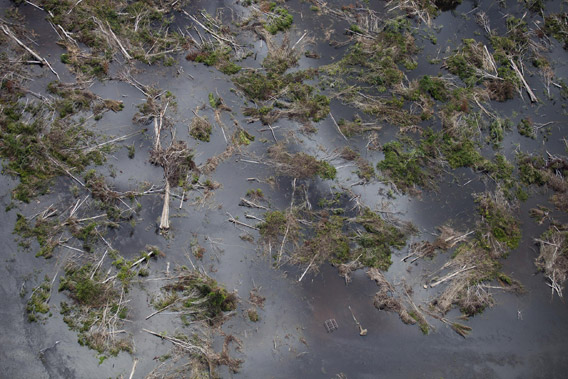
Aerial photo of the construction of a canal for the Belo Monte Dam project, near Altamira. Photo by © Greenpeace/Daniel Beltra.
The Xingu River will never be the same. Construction of Belo Monte Dam has begun in the Brazilian Amazon, as shown by these photos taken by Greenpeace, some of the first images of the hugely controversial project.
Indigenous groups have opposed the dam vigorously for decades, fearing that it will upend their way of life. Environmentalists warn that the impacts of the dam—deforestation, methane emissions, and an irreparable changes to the Xingu River’s ecosystem—far outweigh any benefits. The dam, which would be the world’s third largest, is expected to displace 16,000 people according to the government, although some NGOs put the number at 40,000. The dam will flood over 40,000 hectares of pristine rainforest, an area about seven times the size of Manhattan.
The $11-17 billion Belo Monte dam has been aggressively pushed by the Brazilian government, which argues the dam is necessary to keep up economic growth in the country. The dam would provide energy to 23 million homes, yet during three to four months of the year the dam will only run 10-30 percent capacity due to low waters, an issue that climate change may exacerbate.
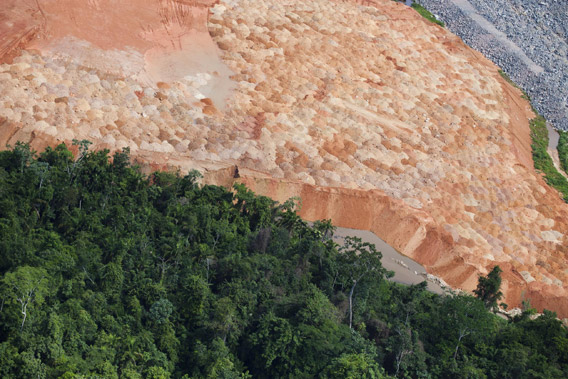
Construction of the Belo Monte Dam project, near Altamira. Photo by © Greenpeace/Daniel Beltra.
While dams are largely touted as clean energy, this is not true in every case. Dams, especially in the tropics, release significant methane emissions due to rotting vegetation in the reservoir. A recent study found that a dam in Laos was still emitting methane a decade after construction.
The Belo Monte dam has faced an endless stream of legal challenges; while construction has been halted a number of times by judges, their decisions have always been overturned.
A chain of massive dams are currently planned throughout the Brazilian Amazon. But to date Belo Monte has faced the fiercest resistance: 600,000 people from around the world signed a petition for the government of Brazil to pull the project.
This summer Brazil is hosting the Rio +20 Summit, marking two decades after the landmark Earth Rio Summit in 1992; the meeting is touted as “conference on sustainable development.”
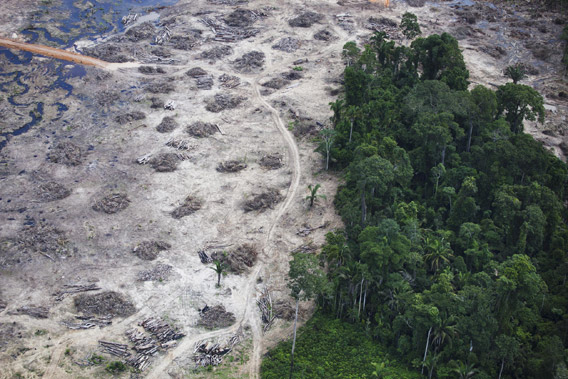
Construction of the Belo Monte Dam project, near Altamira. Photo by © Greenpeace/Daniel Beltra.
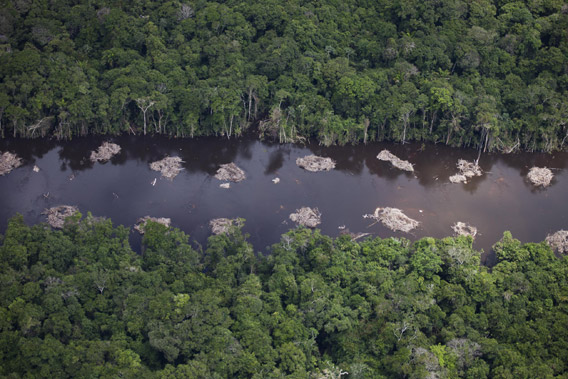
Construction of a canal for the Belo Monte Dam project, near Altamira. Photo by © Greenpeace/Daniel Beltra.
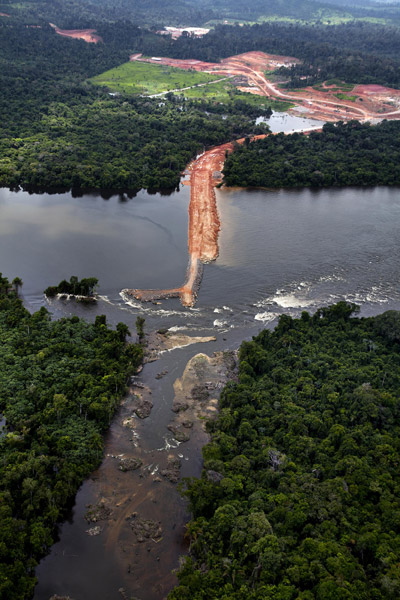
Construction site of the Belo Monte Dam and hydropower project, near Altamira. Photo by © Greenpeace/Marizilda Cruppe.
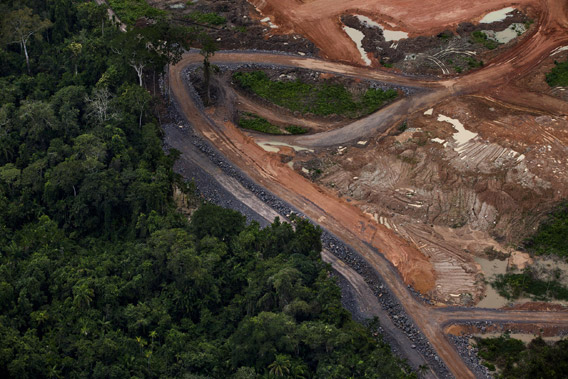
Construction site of the Belo Monte Dam and hydropower project, near Altamira. Photo by © Greenpeace/Marizilda Cruppe.
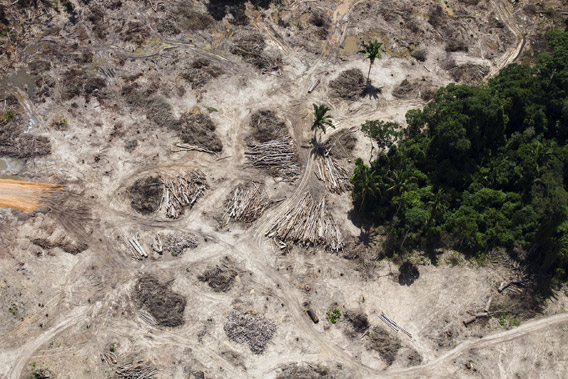
Construction of the Belo Monte Dam project, near Altamira. Photo by © Greenpeace/Marizilda Cruppe.
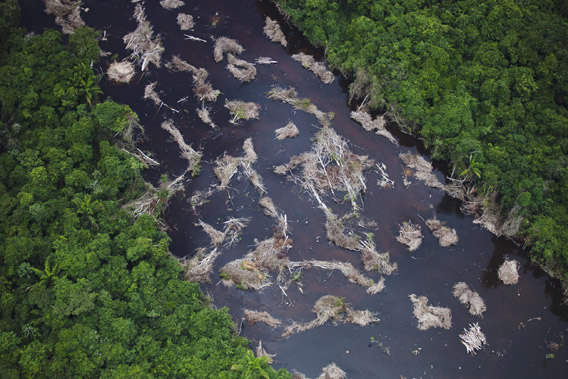
Construction of a canal for the Belo Monte Dam project, near Altamira. Photo by © Greenpeace/Daniel Beltra.
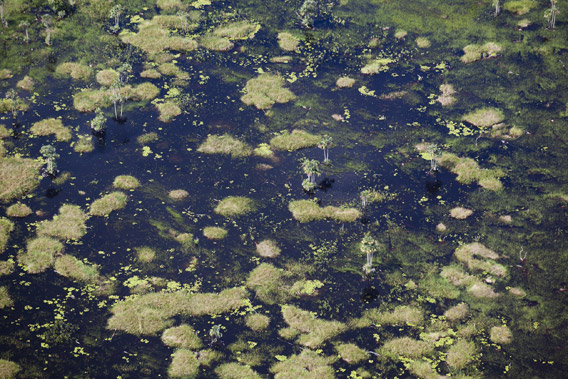
Amazon rainforest during the rainy season in the area of the controversial Belo Monte hydropower plant. Photo by © Greenpeace/Daniel Beltra.
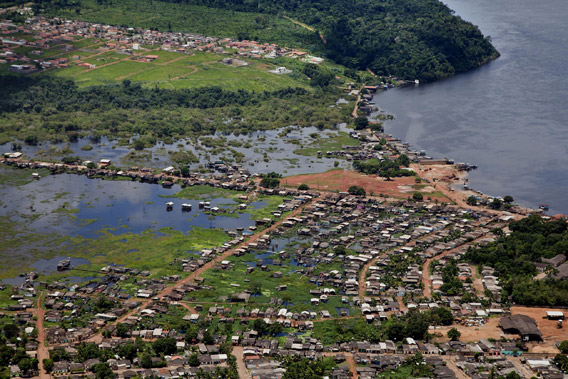
The Invasão dos Padres neighborhood in the Brazilian city of Altamira would suffer from the construction of the nearby Belo Monte Dam project. Photo by © Greenpeace/Marizilda Cruppe.
Related articles
Last chance to see: the Amazon’s Xingu River

(06/15/2011) Not far from where the great Amazon River drains into the Atlantic, it splits off into a wide tributary, at first a fat vertical lake that, when viewed from satellite, eventually slims down to a wild scrawl through the dark green of the Amazon. In all, this tributary races almost completely southward through the Brazilian Amazon for 1,230 miles (1,979 kilometers)—nearly as long as the Colorado River—until it peters out in the savannah of Mato Grosso. Called home by diverse indigenous tribes and unique species, this is the Xingu River.

(06/03/2011) As an American I know a lot about shame — the U.S. government and American companies have wrought appalling amounts of damage the world over. But as an admirer of Brazil’s recent progress toward an economy that recognizes the contributions of culture and the environment, this week’s decision to move forward on the Belo Monte dam came as a shock. Belo Monte undermines Brazil’s standing as a global leader on the environment. Recent gains in demarcating indigenous lands, reducing deforestation, developing Earth monitoring technologies, and enforcing environmental laws look more tenuous with a project that runs over indigenous rights and the environment.
Belo Monte Dam: A spearhead for Brazil’s dam-building attack on the Amazon?
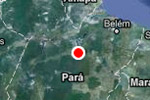
(03/23/2012) Brazil’s Belo Monte Dam on the Xingu River is now under construction despite its many controversies. The Brazilian government has launched an unprecedented drive to dam the Amazon’s tributaries, and Belo Monte is the spearhead for its efforts. Brazil’s 2011-2020 energy-expansion plan calls for building 48 additional large dams, of which 30 would be in the country’s Legal Amazon region1. Building 30 dams in 10 years means an average rate of one dam every four months in Brazilian Amazonia through 2020. Of course, the clock doesn’t stop in 2020, and the total number of planned dams in Brazilian Amazonia exceeds 60.
International Labor Organization raps Brazil over monster dam
(03/07/2012) The UN’s International Labor Organization (ILO) has released a report stating that the Brazilian government violated the rights of indigenous people by moving forward on the massive Belo Monte dam without consulting indigenous communities. The report follows a request last year by the The Inter-American Commission on Human Rights for the Brazilian government to suspend the dam, which is currently being constructed on the Xingu River in the Amazon.
Brazilian mining company connected to Belo Monte dam voted worst corporation
(01/31/2012) The world’s second largest mining company, Vale, has been given the dubious honor of being voted the world’s most awful corporation in terms of human rights abuses and environmental destruction by the Public Eye Awards. Vale received over 25,000 votes online, likely prompted in part by its stake in the hugely controversial Brazilian mega-dam, Belo Monte, which is being constructed on the Xingu River. An expert panel gave a second award to British bank Barclay’s for speculation on food prices, which the experts stated was worsening hunger worldwide.
Brazil begins preliminary damming of Xingu River as protests continue
(01/19/2012) Damming of the Xingu River has begun in Brazil to make way for the eventual construction of the hugely controversial, Belo Monte dam. The Norte Energia (NESA) consortium has begun building coffer dams across the Xingu, which will dry out parts of the river before permanent damming, reports the NGO International Rivers. Indigenous tribes, who have long opposed the dam plans on their ancestral river, conducted a peaceful protest that interrupted construction for a couple hours.
(11/09/2011) Indigenous communities do not have the right to free, prior and informed consultation on the Belo Monte dam because its infrastructure and reservoirs would not be physically located on tribal lands, ruled a Brazilian court.
Hydroelectric dam still a greenhouse gas source after 10 years
(11/01/2011) Hydroelectric power is often promoted as green energy, yet dams, especially in the tropics, can be significant sources of greenhouse gas emissions. When built, reservoirs trap vegetation, which, as it rots, emits both methane and carbon into the atmosphere. A new study in Science of the Total Environment found that a dam in Lao PDR remained a significant source of greenhouse gas emission even a decade after construction.
Occupy Belo Monte: indigenous stage “permanent” protest against Amazon dam in Brazil
(10/27/2011) Hundreds of people are participating in a protest against the controversial Belo Monte dam in Altamira, Brazil, reports Amazon Watch.
Brazil boycotts OAS meeting after sharp human rights rebuke over giant Amazon dam
(10/27/2011) Brazil refused to attend a hearing convened by the Inter-American Commission on Human Rights (IACHR) of the Organization of American States (OAS) over the the controversial Belo Monte dam, reports Amazon Watch, a group campaigning against the hydroelectric project.
Belo Monte dam license ‘illegal’ rules Brazilian federal judge
(10/19/2011) The environmental license for the controversial Belo Monte dam violates the constitutional rights of indigenous communities and is therefore illegal, ruled a federal judge in Brazil on Monday.







